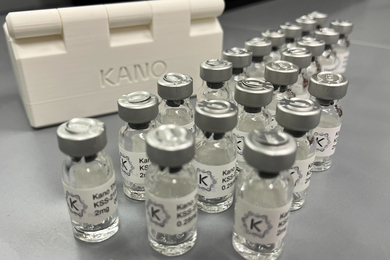MIT researchers reported in the October issue of the Journal of Clinical Endocrinology & Metabolism that doses of melatonin, a pineal hormone that is secreted by humans at night, can help older adult insomniacs obtain a good night's sleep.
During the study, Richard Wurtman, the Cecil H. Green Distinguished Professor and program director of the Clinical Research Center, and other MIT researchers examined the ability of similar doses to restore nighttime melatonin levels and sleep efficiency in adults over age 50.
Two groups of subjects were involved in the study--one group who slept normally and another who experienced insomnia. Each subject received one-week doses of either a placebo or three different doses of melatonin in randomized order. Each different treatment was separated by a one-week "wash-out period."
"According to our research, the physiological dose of melatonin of about 0.3 milligrams restores sleep in adults over the age of 50," said Wurtman, lead investigator in the study. "The adults who would normally wake up during the second and third thirds of the night were able to sleep through the night with the 0.3 milligram dosage."
The researchers also discovered that the typical health food store dosage of melatonin, which is about three milligrams (or 10 times the dosage in the study), is less effective in treating insomnia. In addition, the higher dosage can cause potentially serious side effects, including hypothermia (low body temperature). The study also showed that the higher dosage elevated plasma melatonin levels during the day, which can cause a "hangover" effect in some of the subjects.
"Our study has shown that less is more as far as melatonin is concerned," Wurtman said. "Adult patients who suffer from insomnia and are considering melatonin should consult with their doctor about the appropriate dosage. We have demonstrated that with the correct dosage, melatonin can help an older person experience a restful and uninterrupted night of sleep."
Melatonin is produced by the pineal gland and is often called the "hormone of darkness" because it is secreted in humans and other species only at night. The hormone, whose function has puzzled researchers for centuries, may affect all sorts of circadian and seasonal body rhythms, such as day-night variations in body temperature and the onset of puberty. Melatonin has been shown to help "reset" the body's internal clock in blind people, those suffering from jet lag, and shift workers who work nights and sleep during the day.
The MIT scientists, who included Irina Zhdanova, former principal research scientist in the Department of Brain and Cognitive Sciences, also showed that low doses of melatonin affect sleep in young individuals and can help children with a debilitating neurological disorder called Angelman syndrome to sleep though the night.
The researchers were the first to report that nonhuman primates, whose sleep cycles and melatonin levels are similar to humans', are sensitive to the sleep-promoting effects of melatonin. Such animal models will allow researchers to study the mechanisms of melatonin's action on sleep and to uncover possible benefits or complications that may result from long-term use of the hormone.
This work was funded by the National Institutes of Health and the Center for Brain Sciences and Metabolism Charitable Trust.
A version of this article appeared in MIT Tech Talk on October 17, 2001.





